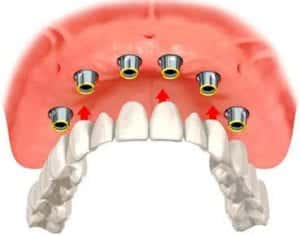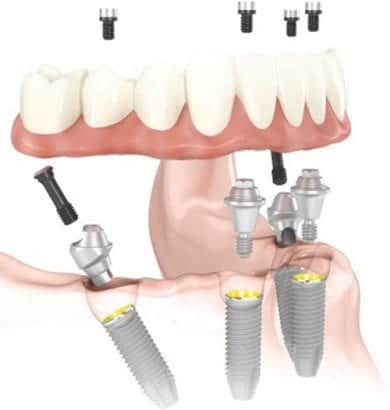
Implant-supported denture
Implant-supported dentures are an entire arch of fixed, non-removable replacement teeth with a base that screws onto six or more dental implants. Implant-supported dentures are more expensive than dentures that snap or clip onto dental implants. How long can you expect your implant-supported denture to last?
How Long Do Implant-Supported Dentures Last?
Implant-supported dentures last at least ten years, but that refers to denture teeth, which require replacement as they wear over time. The dental implants that support the denture can last 20 years, even a lifetime.
How to Help Your Implant-Support Denture Last
You can help your implant-supported with these steps:
Following post-surgical instructions
Your implant specialist will explain how to practice good oral hygiene and support healing at home. Promote your recovery with these steps:
- Maintain a soft foods diet throughout the healing period, which lasts three to five months.
- Avoid vigorous work or strenuous exercise until your implant specialist approves it.
- Keep your follow-up visits for your dentist to examine the surgical sites and your implants.
Maintain routine dental exams and cleaning.
Implant-supported dentures require routine professional dental care. Your hygienist and dentist will inspect your gums for any signs of disease and ensure your implants are free of plaque buildup that can breed bacteria. Your dentist will periodically take a CT scan to ensure your bone is healthy.
Daily cleaning
Follow this daily routine to clean your implant-supported denture:
- Brush your denture teeth with a soft toothbrush.
- Use nonabrasive paste.
- Remove debris beneath the denture and around the implants with a water flosser.
An article on long-term success and survival in the Swedish Dental Journal remarks that patients with low oral hygiene standards who neglect regular dental visits have a higher risk of peri-implantitis. Peri-implantitis is inflammation of the soft tissue around dental implants that can lead to bone deterioration.
Avoiding tobacco use
Even after your jawbone and implants fuse, tobacco use restricts blood flow to your gums and can lead to disease. Unhealthy gums cannot support dental implants and can cause them to loosen and fail.
Protecting your overall health
Daily exercise and healthy food choices help you maintain your overall health. If you have a chronic illness, such as diabetes or high blood pressure, keep it well-controlled to avoid damaging your oral health and the success of your dental implants.
If you are interested in implant-supported dentures, schedule a consultation with an experienced periodontist (implant specialist) to discuss your options.
Atlanta periodontist Dr. David Pumphrey sponsors this post.








